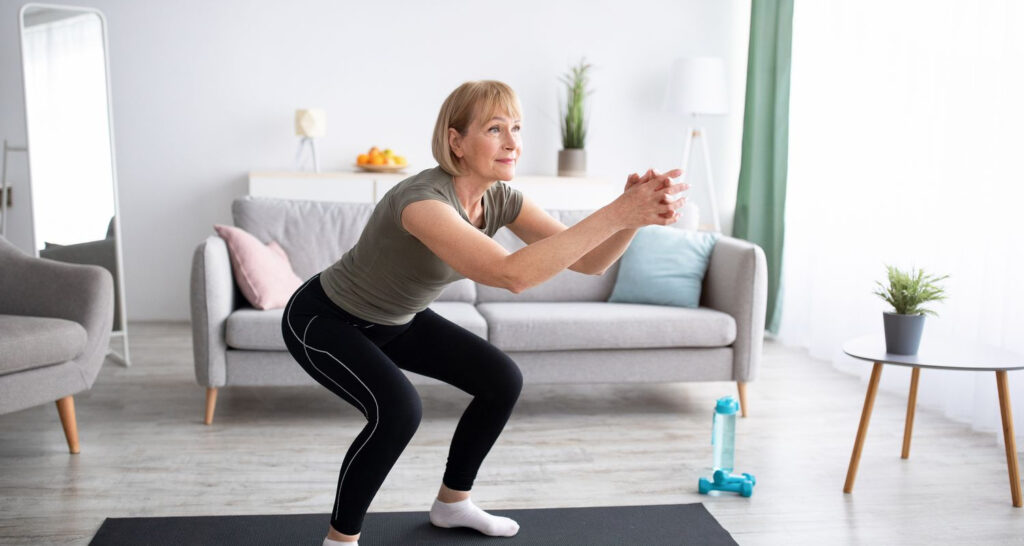As the sun sets on one chapter of life, a new one begins—one filled with the promise of wellness, resilience, and grace. ‘Age Gracefully: The Ultimate Guide to Vitality Through Senior Fitness and Nutrition’ is your compass to navigate the path of aging with vitality and enthusiasm.
Senior-Friendly Exercises: A Guide to Active Aging

As we age, staying physically active becomes increasingly important for overall well-being. Senior-friendly exercises offer a holistic approach to maintaining fitness and flexibility. Here’s a brief overview of exercises tailored to seniors:
- Low-Impact Cardio: Activities like walking, swimming, or stationary cycling provide a gentle yet effective way to boost cardiovascular health. These exercises improve endurance and support heart health without placing excessive strain on joints.
- Strength Training: Strength exercises using resistance bands or light weights help seniors maintain muscle mass, bone density, and overall strength. These workouts contribute to enhanced mobility and functional independence.
- Balance Exercises: Balance is vital for preventing falls and maintaining mobility. Simple exercises like heel-to-toe walking or standing on one leg can help seniors improve balance and stability.
- Flexibility Routines: Stretching exercises enhance flexibility and reduce the risk of injury. Yoga or tai chi are excellent choices, emphasizing gentle movements to increase the range of motion and reduce stiffness.
- Step-by-Step Guides and Video Demonstrations: To ensure exercises are performed correctly and safely, step-by-step guides and video demonstrations are essential. These resources make it easy for seniors to follow along and adopt healthy exercise habits.
Remember, seniors must consult with a healthcare provider before starting a new exercise regimen, especially if they have underlying health conditions. Senior-friendly exercises not only promote physical health but also contribute to improved mental and emotional well-being, helping seniors enjoy a more active and fulfilling lifestyle.
Nutritional Guidelines for Seniors: A Recipe for Healthy Aging

Maintaining a balanced diet is crucial for seniors to support their health and vitality. Here are insights into a balanced senior diet with a focus on essential nutrients:
- Calcium: Seniors should ensure an adequate intake of calcium to support bone health. Dairy products, leafy greens, and fortified foods are excellent sources. Aim for at least 1,200 milligrams of calcium daily.
- Vitamin D: Vitamin D is essential for calcium absorption and overall health. Sun exposure and vitamin D-rich foods like fatty fish, fortified cereals, and supplements when necessary can help maintain healthy levels.
- Fiber: A diet rich in fiber aids digestion and helps manage weight. Whole grains, fruits, vegetables, and legumes provide ample fiber. Seniors should aim for 21-25 grams of fiber per day.
- Meal Planning: Seniors benefit from planning balanced meals. Incorporate lean proteins, whole grains, fruits, vegetables, and dairy into daily meals. Pay attention to portion sizes and avoid excessive salt, sugar, and saturated fats.
- Senior-Friendly Recipes: Explore recipes designed for seniors, which often focus on simplicity, nutrition, and flavor. Dishes like baked salmon with a lemon-dill sauce or a hearty vegetable soup are both nutritious and enjoyable.
- Hydration: Don’t forget the importance of staying hydrated. Encourage seniors to drink water regularly and include hydrating foods like watermelon or cucumber in their diet.
Remember, individual nutritional needs may vary, so seniors should consult with a healthcare provider or registered dietitian to create a personalized meal plan. With a well-balanced diet and mindful meal planning, seniors can enjoy the benefits of a healthy and active lifestyle.
Healthy Aging Tips: Aging Gracefully with Wellness

Aging gracefully involves several key factors for maintaining overall wellness:
- Sleep Quality: Adequate and restful sleep is crucial. Aim for 7-9 hours of quality sleep per night to support physical and mental health.
- Stress Management: Chronic stress can accelerate the aging process. Practice stress-reduction techniques such as meditation, yoga, or deep breathing exercises.
- Regular Exercise: Engage in regular physical activity. This can include low-impact exercises like walking or swimming, which help maintain mobility and vitality.
- Balanced Diet: A diet rich in fruits, vegetables, lean proteins, and whole grains provides essential nutrients. Stay hydrated and limit processed foods.
- Mental Stimulation: Keep your mind active with puzzles, reading, or learning new skills. This helps maintain cognitive function.
- Social Interactions: Stay socially connected. Engaging with friends and loved ones helps combat loneliness and promotes mental well-being.
- Regular Check-ups: Don’t skip medical check-ups. Regular screenings and health assessments are vital for early detection and prevention.
- Hydration: Proper hydration is often overlooked. Drinking enough water supports various bodily functions, including digestion and skin health.
- Sun Protection: Protect your skin from harmful UV rays with sunscreen, hats, and sunglasses to prevent premature aging.
- Positive Mindset: Maintain a positive outlook on life. A strong mindset can have a significant impact on how you experience the aging process.
These tips collectively contribute to aging gracefully and ensuring a high quality of life. Remember, aging is a natural process, and with the right practices, it can be a fulfilling and rewarding journey.
The Mind-Body Connection: Promoting Cognitive Health in Aging

The connection between mental and physical health is vital for aging adults. Several activities promote cognitive health:
- Puzzles and Brain Games: Engaging in puzzles like crosswords, Sudoku, or brain games keeps the mind sharp, and enhances memory, and cognitive skills.
- Meditation: Regular meditation practice reduces stress, improves focus, and supports emotional well-being. It can help maintain mental clarity as you age.
- Physical Activity: Physical exercise has cognitive benefits. Activities like walking, swimming, or yoga boost blood flow to the brain, improving mental acuity.
- Balanced Diet: A nutritious diet with antioxidants and omega-3 fatty acids supports brain health. Foods like berries, fatty fish, and leafy greens are beneficial.
- Social Interaction: Staying socially engaged through friends, family, or community activities promotes cognitive health. It enhances mood and mental agility.
- Continual Learning: Lifelong learning, whether through courses or hobbies, challenges the mind and fosters new neural connections.
- Adequate Sleep: Quality sleep is crucial for cognitive function. It aids memory consolidation and overall brain health.
- Stress Management: Chronic stress is detrimental to mental health. Effective stress management techniques include deep breathing exercises and relaxation practices.
- Brain Health Supplements: Consult a healthcare provider for recommendations on supplements like omega-3 fatty acids or ginkgo biloba, which can support cognitive health.
- Regular Health Check-ups: Monitoring and managing chronic health conditions is essential for maintaining cognitive well-being.
The mind-body connection in aging is a dynamic relationship. By incorporating these activities into your lifestyle, you can promote cognitive health, enhancing your overall well-being as you age.
Preventing Common Health Issues in Seniors

Seniors often face common health concerns like arthritis, osteoporosis, and heart health. Here’s advice on prevention and management:
- Arthritis: Regular low-impact exercise can maintain joint flexibility. Physical therapy and medication can help manage pain.
- Osteoporosis: A diet rich in calcium and vitamin D, along with weight-bearing exercises, can strengthen bones. Medications may be prescribed for osteoporosis.
- Heart Health: A heart-healthy diet with less salt and saturated fats is crucial. Regular exercise, blood pressure monitoring, and cholesterol management are key.
- Medication Management: Seniors should keep an updated list of medications, including over-the-counter drugs, to avoid interactions and side effects.
- Prevent Falls: Fall prevention measures include removing tripping hazards at home, improving lighting, and using assistive devices.
- Regular Check-ups: Schedule routine check-ups with healthcare providers to monitor and manage health conditions.
- Maintain Mental Health: Staying socially engaged and mentally active can contribute to overall well-being.
- Sleep Hygiene: A good night’s sleep is essential for physical and mental health. Maintain a regular sleep schedule and create a comfortable sleep environment.
- Hydration and Nutrition: Seniors should stay well-hydrated and maintain a balanced diet with plenty of fruits, vegetables, and whole grains.
- Avoid Smoking and Excessive Alcohol: Quitting smoking and moderating alcohol intake are crucial for better health.
Preventing common health issues among seniors involves a combination of lifestyle choices, regular healthcare, and awareness of potential risks. This proactive approach can lead to a healthier and more enjoyable senior life.
Inspiring Senior Stories

Sharing real-life stories of seniors who have embraced fitness and nutrition for vibrant lives can motivate others. Here are a few examples:
- Lena’s Active Lifestyle: Lena, at 72, took up swimming, yoga, and a balanced diet to manage her arthritis. Her active life is an inspiration to her community.
- John’s Nutritious Recipes: John, a retired chef, started a blog sharing healthy recipes for seniors. He proves that age doesn’t limit culinary creativity.
- Joyce’s Late-Life Marathon: Joyce completed her first marathon at 65. Her journey from a sedentary lifestyle to running 26.2 miles is a testament to perseverance.
- Healthy Aging Club: A group of seniors in a local community started a club dedicated to fitness and nutrition. They meet regularly for group workouts and share meal plans.
- Warren’s Weight Loss Journey: Warren’s remarkable weight loss story at 70, achieved through mindful eating and regular walks, demonstrates the impact of lifestyle changes.
- Mindful Eating Advocate: Elizabeth, at 80, practices mindful eating and meditation. She enjoys a peaceful and fulfilling life with a focus on inner and outer health.
These inspiring stories highlight the potential of fitness and nutrition in senior life. They serve as real-world examples of how embracing a healthy lifestyle can lead to vibrancy, fulfillment, and a sense of purpose in one’s later years.
Benefits of Staying Active for Seniors

Staying active in senior years offers a multitude of advantages:
- Improved Mobility: Regular exercise enhances strength and flexibility, helping seniors maintain their mobility and independence.
- Reduced Chronic Disease Risk: Physical activity lowers the risk of chronic conditions like heart disease, diabetes, and osteoporosis.
- Enhanced Emotional Well-Being: Exercise releases endorphins, reducing symptoms of depression and anxiety while promoting a positive outlook.
- Weight Management: Senior fitness programs assist in maintaining a healthy weight, reducing the strain on joints and organs.
- Cognitive Health: Physical activity supports cognitive function and reduces the risk of conditions like dementia.
- Social Engagement: Seniors who engage in group fitness activities benefit from social interactions, combating loneliness.
- Better Sleep: Regular exercise often leads to improved sleep quality and duration.
- Pain Management: It can alleviate pain from conditions like arthritis.
- Heart Health: Exercise strengthens the heart, leading to improved cardiovascular health.
- Longevity: Active seniors tend to live longer, healthier lives.
These benefits underscore the importance of staying active in the senior years, contributing to a higher quality of life and overall well-being.
Importance of Consulting a Healthcare Professional for Fitness and Nutrition

It’s crucial to consult healthcare professionals and specialists when planning fitness and nutrition routines, for several reasons:
- Personalization: Healthcare providers can tailor fitness and nutrition plans to an individual’s unique health needs and goals.
- Safety: Professionals ensure that exercises and dietary changes are safe, minimizing the risk of injury or health complications.
- Underlying Conditions: They can identify underlying medical conditions that may impact fitness and dietary choices.
- Medication Interactions: Specialists can assess how exercise and nutrition might interact with medications and adjust accordingly.
- Monitoring Progress: Regular check-ins allow for the monitoring of progress and necessary adjustments to the plan.
- Holistic Health: Healthcare professionals consider not just physical health but also mental and emotional well-being.
- Prevention: They can provide guidance to prevent or manage chronic diseases through lifestyle changes.
- Accountability: Regular appointments create accountability, increasing adherence to the plan.
- Expert Guidance: Professionals possess expert knowledge of the latest research and best practices.
- Long-Term Success: Consulting experts enhances the chances of long-term success in achieving fitness and nutrition goals.
In summary, seeking advice from healthcare professionals and specialists ensures safe, effective, and personalized fitness and nutrition routines, promoting overall health and well-being.
Importance of a Supportive Environment for Senior Fitness

Creating a supportive environment is essential for senior fitness. Here’s why:
- Motivation: Support from family, friends, or peers in senior fitness classes can boost motivation, making it more likely to stick to a fitness routine.
- Accountability: A supportive network can help seniors stay accountable, encouraging regular exercise and healthy habits.
- Social Interaction: Participation in local groups or senior fitness classes fosters social interaction, reducing feelings of isolation and improving mental well-being.
- Structured Guidance: Senior fitness classes offer structured programs led by professionals, ensuring safe and effective workouts.
- Variety: In group settings, seniors can engage in a variety of exercises, which can be more enjoyable than working out alone.
- Emotional Support: Supportive environments offer emotional backing, reducing stress and enhancing emotional well-being.
- Family Involvement: Family members can help with transportation, meal planning, and moral support, contributing to a holistic fitness approach.
- Goal Achievement: A support system can assist in setting and achieving fitness goals, increasing the likelihood of success.
- Adaptability: Group activities can be adapted to various fitness levels and needs.
- Health Benefits: Engaging in a supportive fitness environment can lead to reduced risk of chronic diseases and improved overall health.
In short, a supportive environment, whether through senior fitness classes, local groups, or family involvement, plays a crucial role in maintaining senior fitness and promoting physical, mental, and emotional well-being.
